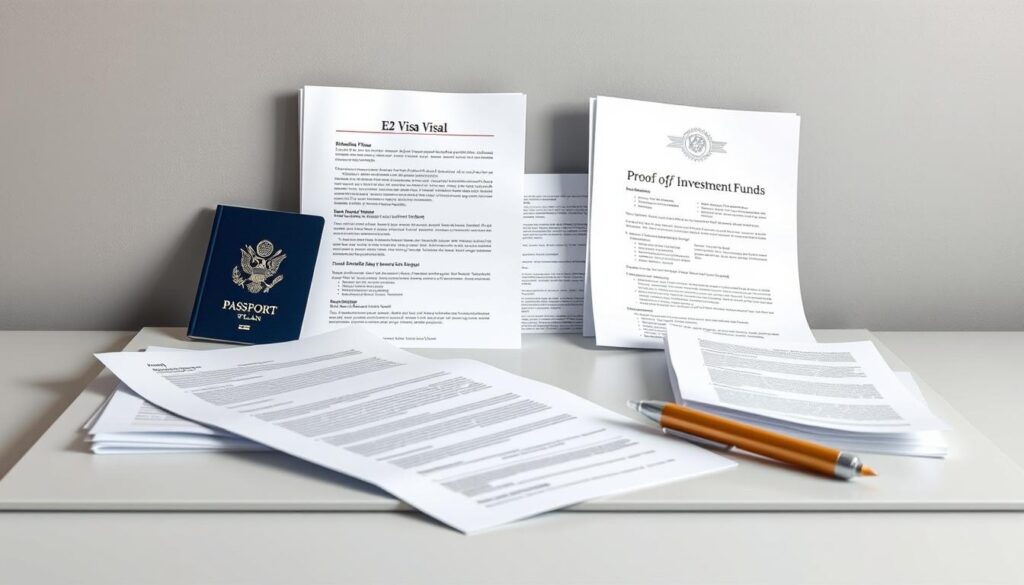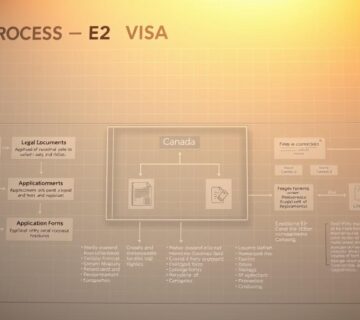Table of Contents
Canada E2 Visa Country List: Eligibility & Requirements
Did you know that over 70 countries have signed a treaty of commerce and navigation with the United States, making their nationals eligible for the E-2 visa? This visa program is a powerful tool for investors seeking access to the U.S. market. The E-2 visa allows individuals to live and work in the United States by investing in a qualifying business, making it a popular choice for entrepreneurs and business owners.
For Canadian nationals, understanding the E-2 visa process is crucial. The visa does not lead to permanent residency but offers the flexibility to renew indefinitely, provided the business remains operational. To qualify, applicants must demonstrate that their investment is “at risk,” meaning the funds are subject to loss based on the business’s success or failure.
This article provides a detailed breakdown of the E-2 visa program, focusing on eligibility, requirements, and country-specific information. Raman Sohi and the Sohi Law Group focus their practice on immigration matters and regularly assist clients with the E-2 visa process. For guidance, contact them at 833-877-9797.
Our goal is to simplify the process, offering actionable steps for your application. Whether you’re exploring investment opportunities or seeking to expand your business, this guide will provide the insights you need.
Overview of the E Visa Programs and Their Purpose
The E Visa programs are designed to facilitate trade and investment between the United States and treaty countries. These programs are divided into two main categories: the E-1 Treaty Trader Visa and the E-2 Treaty Investor Visa. While both visas encourage economic engagement, they serve distinct purposes.

Understanding Treaty Trader versus Treaty Investor Visas
The E-1 Visa is tailored for individuals and businesses engaged in substantial trade activities, primarily focused on the exchange of goods and services. On the other hand, the E-2 Visa is designed for investors who commit capital to establish or purchase a U.S. business, with the intent to actively manage the operation.
Historical and Current Treaty Context
The foundation of these visa programs lies in treaties established as early as 1854, with countries like Argentina. These treaties have evolved over time, with Portugal being the most recent addition, set to join in March 2024. Such agreements underscore the U.S. commitment to fostering international economic partnerships.
For a general overview of treaty visas, see U.S. Department of State resources.
Understanding the E-1 and E-2 Visa Categories
The E-1 and E-2 visas are two distinct programs designed for nationals of countries with U.S. treaties of commerce and navigation. While both encourage economic engagement, they cater to different activities.
Key Differences Between E-1 and E-2
- E-1 Visa: Focus on substantial trade of goods and services.
- E-2 Visa: Requires a significant investment and active management of a U.S. business.
As noted by immigration professionals, “The E-2 visa is particularly appealing due to its indefinite renewal possibility, provided the business remains viable.” This makes it a favorable option for entrepreneurs seeking long-term U.S. presence without immediate plans for permanent residency.

E-2 Country List: Eligibility Requirements and Qualified Nations
The E-2 visa program is accessible to nationals from over 70 treaty countries, each with its own specific requirements and treaty history. To qualify, a nation must have a treaty of commerce and navigation with the United States, demonstrating a commitment to facilitating trade and investment.
Eligibility criteria include:
- Significant investment in a U.S. business
- Active management of the enterprise
- Substantial capital contribution
- Business viability and job creation potential
Applicants must refer to official guidelines to ensure compliance with current treaty terms.
Benefits of Being an E-2 Treaty Investor
Being an E-2 Treaty Investor offers numerous advantages for entrepreneurs and business owners. This visa program allows temporary residence and work in the U.S. for investors, with the possibility of renewal as long as the business remains viable. It does not lead directly to permanent residency.
Family Inclusion and Travel Flexibility
- Spouses and unmarried children under 21 can accompany the visa holder.
- Spouses may obtain work authorization.
- E-2 visa holders can travel in and out of the U.S. without restrictions.
Indefinite Renewal Possibility
The E-2 visa can be renewed indefinitely, provided the business remains viable and continues to meet the visa requirements.

Essential Documents and Application Requirements
When preparing your E-2 visa application, it’s crucial to gather all necessary documents:
- Completed DS-160 Form
- Valid passport
- Photographs meeting visa specifications
- Business plan with financial projections
- Proof of investment
- Financial statements and legal documents
Investment Criteria and Business Plan Essentials
Understanding the investment criteria is crucial for a successful E-2 visa application. A well-structured business plan is essential, showing market research, financial projections, and a clear management strategy.
“A robust business plan and proper documentation are the cornerstones of a successful E-2 visa application.” — Raman Sohi, Sohi Law Group
A Step-by-Step Guide to the E-2 Visa Application Process
- Prepare Documentation – Gather necessary documents.
- Submit Application – Complete DS-160 and submit to the U.S. embassy/consulate.
- Attend Interview – Application reviewed and assessed by consular officers.
Expert legal guidance can help streamline this process.

Considerations for Applicants from Non-Treaty Countries
Applicants from non-treaty countries may explore alternatives, such as citizenship-by-investment programs in treaty nations, or other visa categories like the EB-5 investor visa.
Expert Guidance from Sohi Law Group
The Sohi Law Group has assisted many clients in successfully navigating investor visa applications. While outcomes depend on each applicant’s unique circumstances, the firm provides thorough guidance to support clients through the process.
How to Reach Us: Call 833-877-9797
Conclusion
In conclusion, the E-2 Treaty Investor program offers a pathway for entrepreneurs and investors seeking to establish a business presence in the United States. By understanding eligibility criteria, documentation requirements, and application steps, applicants can navigate this complex process with confidence.
Don’t hesitate to reach out to the Sohi Law Group at 833-877-9797 for assistance. With proper planning and support, the E-2 visa program can unlock new opportunities for you and your business.

Frequently Asked Questions (FAQ)
1. What is an E-2 visa and how does it differ from a green card?
The E-2 visa is a non-immigrant visa that allows citizens of treaty countries to invest in and manage a U.S. business. Unlike a green card, it does not provide permanent residency but can be renewed indefinitely as long as requirements are met.
2. Which countries are eligible for the E-2 visa?
Nationals of countries with treaties of commerce and navigation with the U.S. are eligible. A full list is available through the U.S. Department of State.
3. Can I apply for an E-2 visa if my country does not have a treaty with the U.S.?
No, but some individuals may pursue alternatives such as the EB-5 investor visa or citizenship-by-investment in a treaty country.
4. What are the main requirements for the E-2 visa?
You must be a citizen of a treaty country, make a substantial at-risk investment, actively manage the business, and show that it will contribute positively to the U.S. economy.
5. How long does the application process take?
Timelines vary depending on the U.S. consulate handling the application but usually take several months.
6. Can my spouse and children join me on an E-2 visa?
Yes. Spouses can obtain work authorization, and children under 21 may attend school in the U.S.
7. Can I renew my E-2 visa?
Yes, as long as the business remains viable and compliant, renewals are possible indefinitely.
8. Does the E-2 visa lead to permanent residency?
No. The E-2 visa does not provide a direct pathway to permanent residency or a green card.

Disclaimer: This article provides general information and should not be considered legal advice. For personalized guidance, please consult a qualified immigration lawyer.




No comment